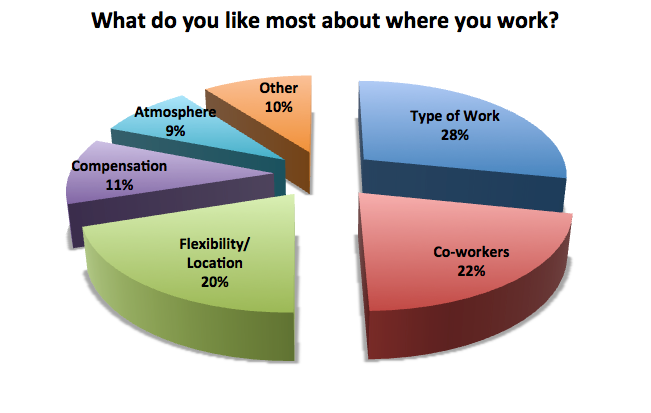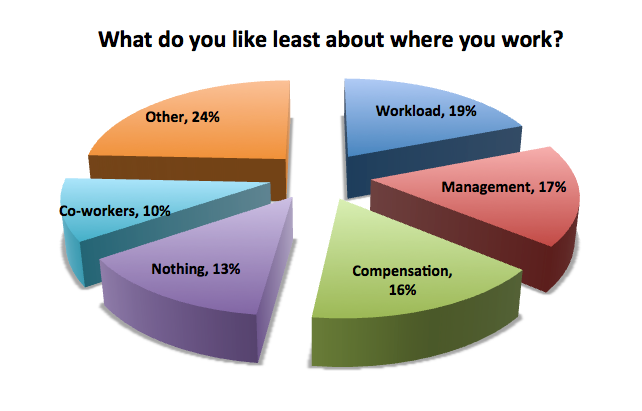In an attempt to find out what things employees like and dislike about their jobs and thus what is motivating and de-motivating, we asked 500 knowledge workers with full time jobs a set of questions about their work and environment. Among the questions were two that asked:
- What do you like most about where you work?
- What do you like least about where you work?
What we found was in some ways quite surprising.
- Managers and employees like pretty much the same things. This means that the two groups have pretty much the same motivators. The two highest ones are the type of work they get to do and the type of people they work with.
- In terms of what they don’t like, the common themes were the workload, management and compensation. There are substantial differences between the two groups though. Managers are much more inclined to dislike the workload than employees do. Employees and much more inclined to dislike management.
For a PDF copy of this report click here: Things employees like and dislike about their jobs.
Things employees like – Motivators
When asked what things employees like most about work, they bring up the type of work they do, their co-workers, and the degree of flexibility at work. There is not much difference between people who are managers versus those who are employees. The greatest difference is managers are more likely to like the type of work they do than employees.
Given the lack of difference between the two groups, there is little that needs to be done differently in motivating them. The one surprising finding was that of flexibility. The number of people who felt that the thing they liked most was flexibility was greater than expected. Since this is something over which managers have total control, it behooves them to attempt to make the workplace more flexible to increase employee satisfaction with work.
Things employees dislike – demotivators
When asked what things employees like least about work, they bring up the workload, management and compensation. It was pleasing to see that 13% of people could find nothing unlikeable about work.
There is however a lot of difference between people who are managers versus those who are employees in terms of what they dislike.
- 25% of managers dislike their workload compared to 15% of non-managers showing that the burden of over-work is placed more often than not on managers.
- Non-managers on the other hand, disliked management more than any other thing at 21% whereas there own managers only disliked it 11% of the time
- Finally, managers at 19% were much more likely to find nothing to like about their jobs whereas non-managers stated this only 10% of the time.
Conclusions
These results, while not extensive go a small way to proving what Herzberg, Mausner, & Snyderman stated based on research in 1959. They claim that to the degree that motivators are present in a job, motivation will occur. The absence of motivators does not lead to dissatisfaction. Further, they stated that to the degree that hygienes are absent from a job, dissatisfaction would occur. When present, hygienes prevent dissatisfaction, but do not lead to satisfaction.
Motivators, the existence of which lead to satisfaction
- Achievement
- Recognition
- Work itself
- Responsibility
- Advancement
- Growth
Hygienes, the lack of which lead to dissatisfaction
- Company policy
- Supervision
- Relationship with boss
- Work conditions
- Salary
- Relationship with peers
- Security
It is instructive to note that our research turned up less than 1% of respondents who thought that management was the thing they liked most about their work. Both the statistics we generated and the research we cited would imply that good leadership is not a motivator. But bad leadership is a de-motivator. But our research does seem to imply that the quality of relationship with one’s peers is actually a motivator.


